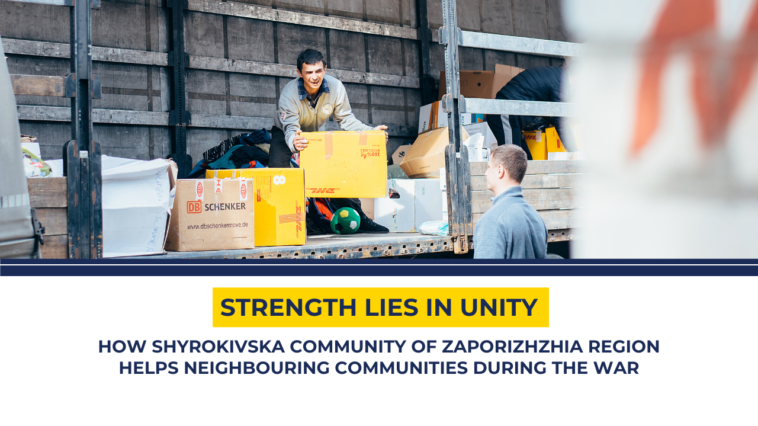The fighting continues in the Zaporizhzhia region. Four of the five rayons of the region are temporarily occupied by Russian troops. Shyrokivska village territorial community, located near Zaporizhzhia, has become a humanitarian centre and helps neighbouring communities survive by delivering essentials and food and providing shelter for displaced persons fleeing occupation and hostilities. Since the beginning of the Russian aggression, residents have sent more than 60 tons of medicines, food, and hygiene products to the communities of Zaporizhzhia region.
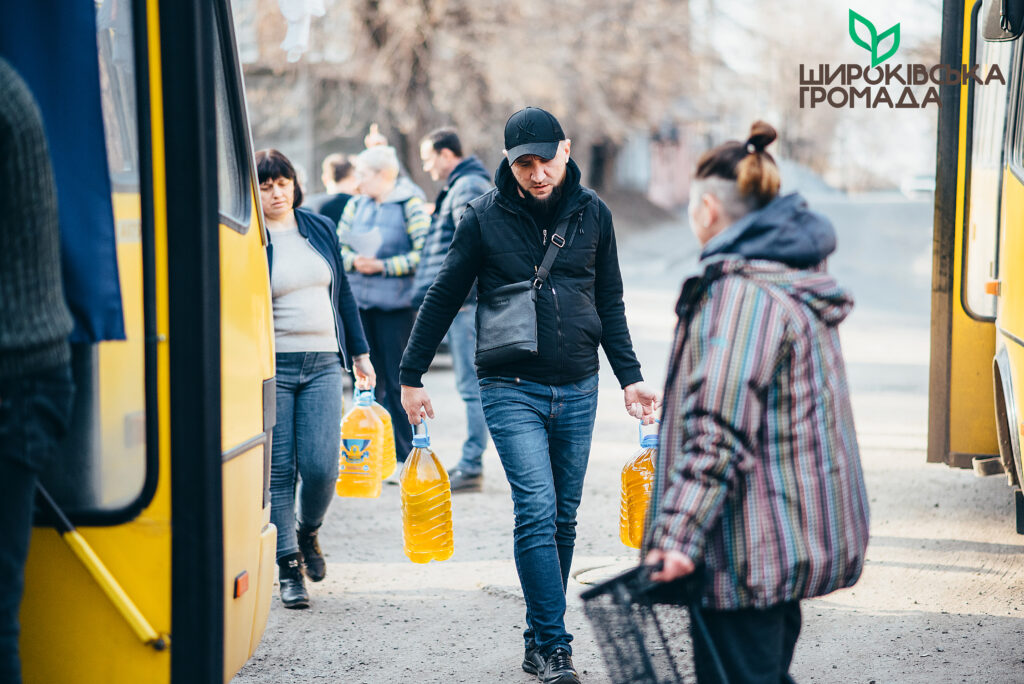
Only together it is possible to cope with the challenges of war!
Since the first days of the war between Ukraine and Russia, the Humanitarian Headquarters, a centre for receiving and distributing aid, has been established in Shyrokivska community. In addition to providing locals, IDPs, and the military with everything they need, residents support other communities in Zaporizhzhia region.
Altogether, Shyrokivska community has already supported more than half of the region’s 60 existing communities. Among them are Huliaipole, Orikhiv, Komyshuvakha, Polohy, Stepnohirsk, Komysh-Zoria, and many other settlements.
“Our assistance is focused on two areas. On the one hand, we help communities with the most necessary things and products, and on the other hand, we provide shelter for IDPs. Humanitarian aid comes to the warehouses of Shyrokivska community in several ways. First of all, we have friendly relations with two Polish and two German cities, which are helping us a lot right now. We are also looking for access to various international funds. We cooperate with the communities of western Ukraine and Zaporizhzhia Regional Humanitarian Headquarters. Recently, I delivered aid to the residents of Orikhivska community, which is currently in the war zone. The other day we received humanitarian aid, which was collected at the initiative of the staff of the international program that supports decentralization. I am convinced that only by joint efforts will we be able to cope with the challenges of the war,” believes Denys Korotenko, head of Shyrokivska village community.
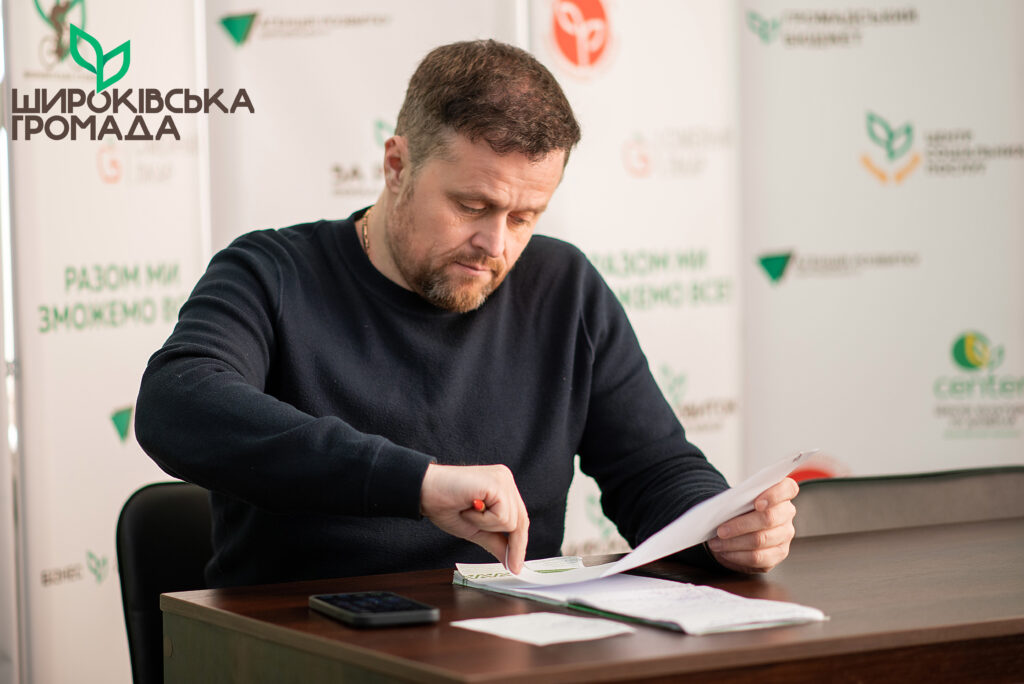
The 20-ton cargo of medicines, food, and hygiene products, which was recently delivered to the warehouses of Shyrokivska community, is intended for communities that are partners of the international program supporting decentralization in Zaporizhzhia region.
“We have organised a volunteer team, which raised aid together with the Help and Care and Razom for Ukraine foundations and other humanitarian organisations in Lviv. In addition, necessities were purchased and transportation services were financed at the expense of the staff of the international program. We want to support our communities with which we worked before the war,” said Viktoria Zubkova, one of the initiators of the organisation of assistance to communities in Zaporizhzhia region.
According to Denys Korotenko, in addition to external support, local agricultural enterprises managers and farmers are also helping to collect humanitarian aid for neighbouring communities. One of them is Roman Tarasevych, director of PJSC Soniachne 2007. This enterprise grows grain crops.
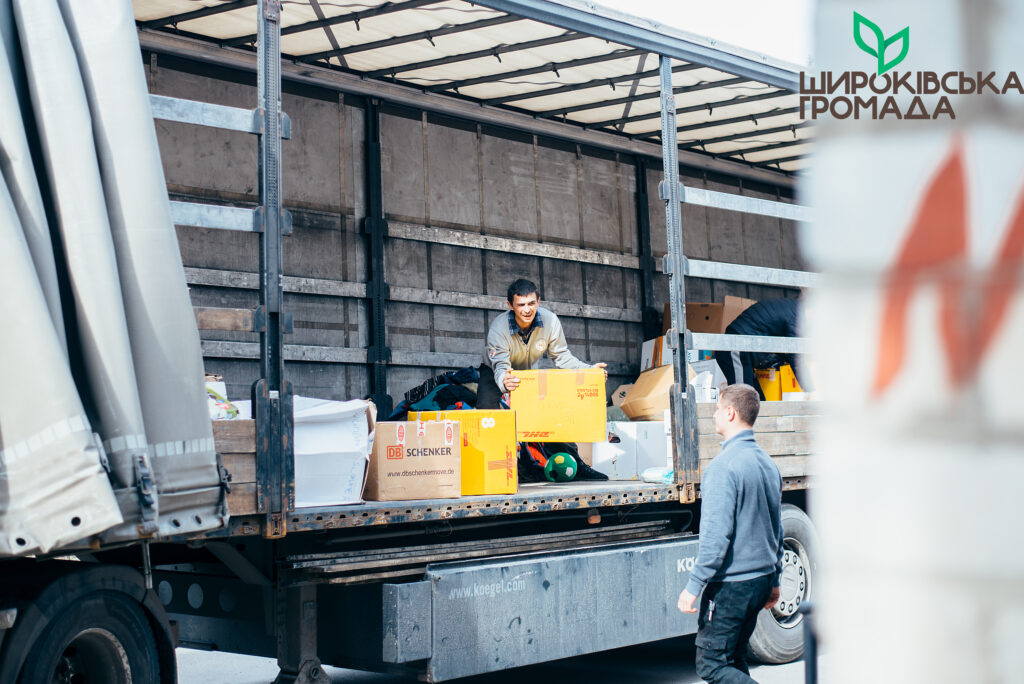
“Since the beginning of the war, we have been giving away our products to the community for free: wheat, barley, and other grains, as well as sunflower seeds, which are processed into flour, cereals, and oil. We have been forming food stocks for several months. We believe in the Armed Forces, so we sow all the areas, including those that were left purposely unploughed before, with food crops, so that after the victory we were able to feed as many residents of the region as possible. After all, due to the fighting in Zaporizhzhia region, only 20-25 percent of agricultural land will be sown. At the same time, where there is such an opportunity, we try to help farmers in the region who are forced to work under the temporary occupation,” said Roman Tarasevych.
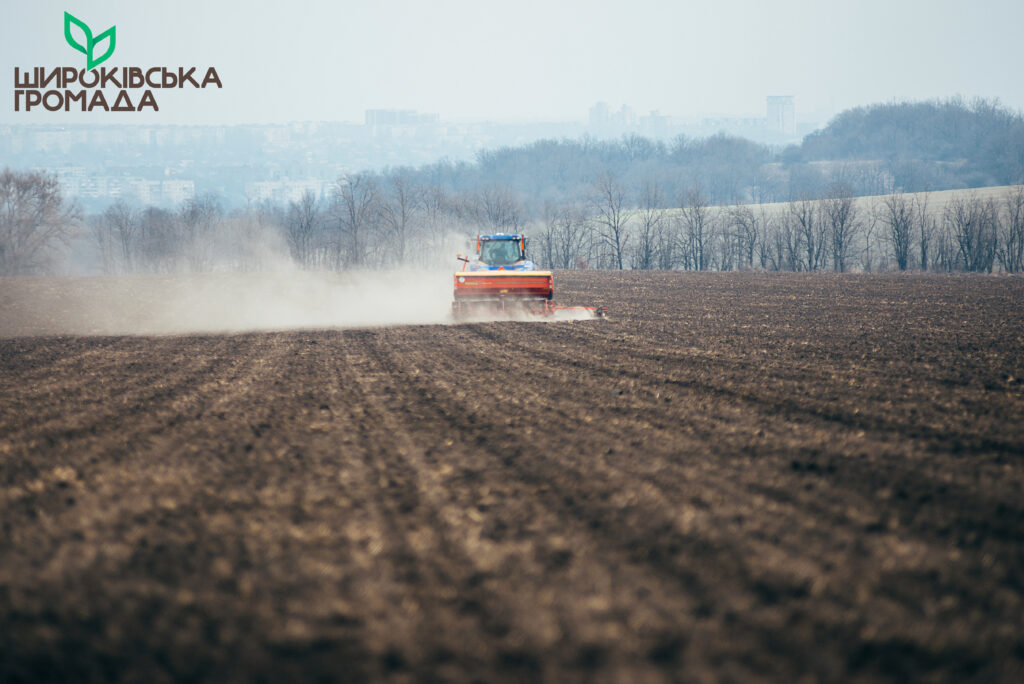
Different towns and villages, stories and people united by a common misfortune
Since the beginning of the war, Shyrokivska community has sheltered about 800 IDPs, a third of whom are children and adolescents. At first, they stayed here for 1-3 days, but later more and more people fleeing the temporarily occupied territories and the war zone began to look for housing for permanent residence.
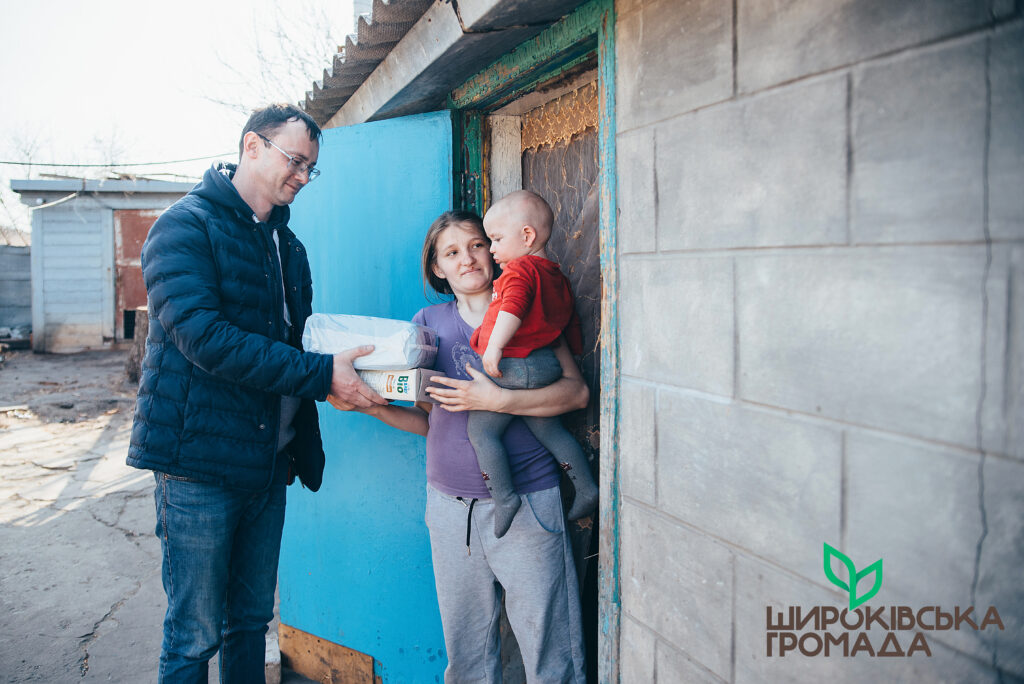
“We call these people “new residents” and “our friends” trying not to use the word “displaced”. We are resettling our new residents in 35 settlements of the community in private households and educational institutions. Many people live in their relatives’ households. Starosty of these settlements are in direct contact with IDPs and learn about their needs, which are different for everyone. People also approach our department, call, come, and we solve their problems together,” said Nataliia Malyshkina, Acting Head of the Social Protection Department of the Shyrokivska community.
Twice a week, newcomers receive food kits and hygiene products. The number of people in the family and their needs are taken into account. During the issuance of food kits, volunteers consult on how to obtain a certificate of IDP status and receive assistance.
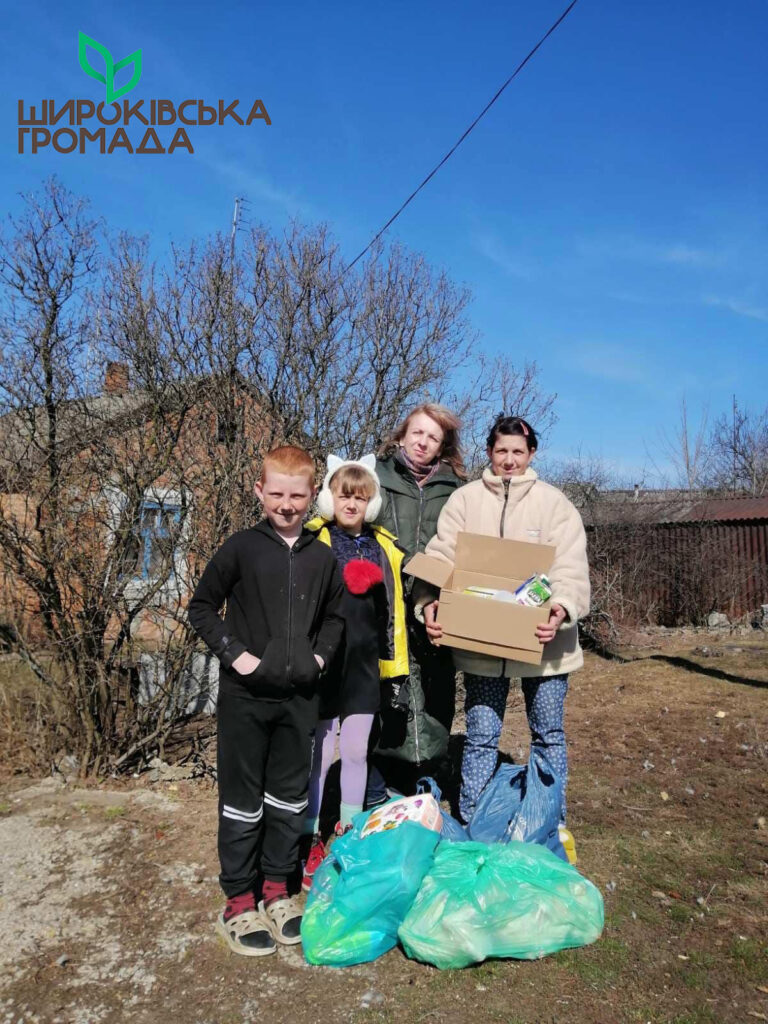
Moreover, the Centre for Administrative Services operates almost around the clock at each starosta office of the community, whose employees issue certificates and help obtain state aid. Even before the war, the community began field meetings of representatives of various departments of the village council with residents of settlements. This tradition continues today, so many issues can be resolved on the ground.
In addition, all IDPs have the opportunity to contract with family doctors. They can receive the necessary medicines free of charge by doctors’ prescription in parallel with the state program “Affordable Medicines”. Medicaments come to the community from various charitable foundations.
The biggest problem today, according to Nataliia Malyshkina, is unemployment. IDPs are ready to work, but, unfortunately, there are not enough jobs for everyone. In the meantime, new residents are involved in volunteer work. Together with locals, they cook dumplings, bake Easter cakes, prepare stews, weave camouflage nets, and take part in cleaning the villages in which they live.
The community also provides education services. All children go to school, and employees of local houses of culture conduct classes for them when possible.
People from different cities and towns and with different stories came to Shyrokivska community, but they are all united by a common grief.
“I was most moved by the story of a woman who fled Orikhivska community. She ran away with her two children while being in the last weeks of her pregnancy. The woman gave birth to a healthy boy on March 8. She now lives in our community with her three children. Another man with a disability came to us from Borodianka – he lost his feet because of the war,” said Nataliia.
IDPs, according to Nataliia, also need psychological support. There are psychologists in the community who work with new residents who sometimes just need to speak out and share their emotions and experiences. Nataliia is especially acutely aware of the pain of losing because the war with Russia has taken away her husband and the father of her three children, who deliberately went to defend his country. She says that there are people who call every evening just to talk, to tell how they spent a day. They need to know that they are not alone in their troubles and that someone will support them as relatives. Nataliia herself helps to cope with the heavy loss through work, communication with people, and the support of the team of Shyrokivska community. She believes that Ukraine will win. After all, when new Ukrainians are born, life already wins, and in her native community as well.
Author: Oksana Yakunina
Photos provided by the Shyrokivska community.

